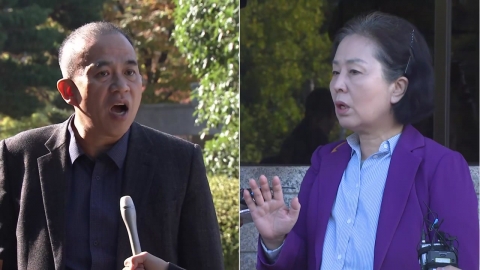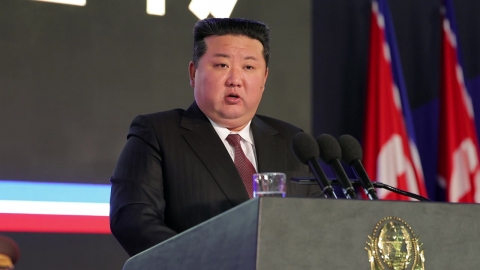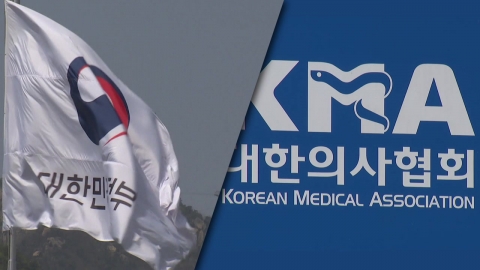■ Starring: Doo Jin-ho, Director of International Strategy Research at the Korea Defense 硏
* The text below may differ from the actual broadcast content, so please check the broadcast for more accurate information. Please specify [YTN NewsNOW] when quoting.
[Anchor]
North Korean leader Kim Jong-un mentioned that he was convinced of a hostile North Korea policy through negotiations with the United States. Some analysts say that he drew a line on his observation of "conversation mode" with former President Donald Trump. For more information, let's talk with Doo Jin-ho, head of the International Strategy Research Division at the Korea Defense Research Institute. Welcome.
[Doo Jin-ho]
Hello,
[Anchor]
North Korean leader Kim Jong-un said this. Negotiations with the United States went as far as it could go. First of all, it is the first time that former President Trump has expressed his position since he was elected this time. How did you see it?
[Doo Jin-ho]
Anyway, I believe that the results of the U.S. presidential election have been formalized internally in North Korea. I've gone all the way to the point through some kind of negotiation with President Trump, and I revealed it through the Korean Central News Agency. In a way, the fact that we've been there means that we also have love and hatred, and that's how much we know about each other. It metaphorically shows that it knows what is needed, so rather than a declaration that he will not talk to the new Trump administration, which will be launched in January next year, the possibility of dialogue is still open, which is evaluated as a slight circumvention.
[Anchor]
You said that you left room for dialogue as well as an angle, but what is your current probability of meeting with President-elect Trump next time?
[Doo Jin-ho]
Perhaps it will not be easy to meet immediately after the new Trump administration is launched. Since North Korea has already sent troops to Russia, there are some equal relationships, but there are also subordinate aspects, so there is a possibility that the U.S.-North Korea dialogue will be partially adjusted after the launch of the new Trump administration and the U.S.-North Korea relationship is sorted out. So, there is a possibility that the US-North Korea relations dialogue will resume through Russia, so I see it like this.
[Anchor]
Chairman Kim Jong-un visited a highly enriched uranium manufacturing facility in September. This prediction came out at the time that it was a steel wire, but now it is an undeclared nuclear facility in a steel wire, right?
[Doo Jin-ho]
So the IAEA, Secretary-General Grossi last September, where the North Korean authorities didn't specify, but as you can see on the screen, where they can produce highly enriched uranium, eventually the steel wire complex. It has the capacity to produce at least twice as much highly enriched uranium as the Yongbyon complex, and on top of that, it continues to build and expand the steel base itself, so it actually has more centrifuges in it called Kesicade that can be continuously enriched, so it's a facility that can produce quite a lot of highly enriched uranium, as you can see.
[Anchor]
If you mentioned that it's twice as bad as before, can't you see it like this?
[Doo Jin-ho]
Chairman of the State Affairs Commission Kim Jong-un once said that. It was said that nuclear force should be increased exponentially, and that is, in the end, they can produce such things at the Yanbian and Gangseon facilities. Usually, 1,000 highly enriched centrifuges can produce 20 kilograms of highly enriched uranium per year. Considering these capabilities, North Korean authorities can produce at least 10 nuclear warheads per year if the existing plutonium capabilities are considered. Considering the high-enriched uranium produced by Gangseon and Yongbyon, which currently have 80 to 100 nuclear warheads, as well as the nuclear materials, North Korea has secured enough capabilities to have about 300 nuclear warheads as it wants by 20230.
[Anchor]
There seems to be no choice but to raise concerns about the North's growing threat, but isn't North Korea sending troops to Russia now? There is also news that a high-ranking North Korean military official has been injured.
[Doo Jin-ho]
It probably looks like Kursk. According to the Wall Street Journal, a high-ranking North Korean general was injured during the Kursk airstrike. The high-ranking North Korean generals we know are Shin Geum-chul, the chief of operations, Lee Chang-ho, and Kim Young-bok, the deputy chief of the North Korean General Staff. Except for these personnel, at least 13,000 North Korean soldiers have been dispatched, so there is a possibility that various general officials related to intelligence and operations have entered the area. If a North Korean general-level official was injured by a Ukrainian attack, the location where the North Korean general attacked, or where the North Korean military general was, can be assumed to be the location of the North Korean command center called the North Korean and Russian coalition command center. In any case, since a high-ranking North Korean general received such an idea, I predict that the North Korean military will probably take such measures to retaliate again, regardless of the level of injury.
[Anchor]
It's an air-to-ground missile supported by the UK this time, and it's said to have been hit by storm shadow this time, so please introduce what type of missile it is.
[Doo Jin-ho]
Storm Shadow is an air-to-ground missile made jointly in the UK and France, called Scalp. It is usually a weapon that can be mounted on a fighter jet and hit a ground target. It basically has an induction function. And it belongs to a long-range guided missile because it can fly more than 300 kilometers like this. In the meantime, the U.S., Britain, and France have not approved the use of such long-range missiles as Storm Shadow or Scalp, but now the U.S. has allowed the U.S. to proactively use the Atex missiles because Ukraine is gradually losing its ability to sustain war and the situation on the Ukrainian front line is intensifying before the new U.S. government is launched next year.
In addition, the United Kingdom and France approved the use of storm shadows and Scalp missiles for long-range use. From Russia's point of view, this missile is bound to be quite threatening. In the past, if the Ukrainian military used the missile in some limited areas, that is, in some limited areas of Russia and Ukraine, it is now possible to mount it on fighter jets and use it in Kursk or on the border, and furthermore, there is a possibility that the Ukrainian military will sufficiently strike Russia's sincere targets such as Moscow while avoiding Russia's air defenses.
[Anchor]
You're talking about the mainland hit part, right?
[Doo Jin-ho]
That's right.
[Anchor]
There are still talks about the possibility of the North Korean military sending additional troops to Russia. What do you think is the possibility of sending additional troops to Russia?
[Doo Jin-ho]
First of all, we need to look at it from two aspects. It's either the European Parliament or the Ukrainian Parliament. There is one thing that Ukrainian President Zelensky has said several times that the dispatch of North Korean troops will not end at the first dispatch, that is, 13,000 troops, and that it could expand to 100,000 in the future. The second is that in the Krask region east of Urals, some identified by civilian satellites, human information and human resources living in the region, 170mm North Korean artillery, and 240mm launchers are expected to travel by rail to the Kursk region.
If so, most of the first deployment is based on North Korean special operations forces, but in the end, the North Korean military's technical personnel are needed to operate 170mm artillery or 240mm multiple rocket launchers. Artillery, equipment to support them, ammunition, communication, and other various kinds of functions will inevitably be added, so the dispatch will probably end first from 13,000 people. Furthermore, we can fully expect additional dispatch to support these functions.
[Anchor]
US Indo-Pacific commander Samuel Papua said this. Russia may give North Korea submarine technology in exchange for the dispatch of troops this time. Isn't this what Chairman Kim wants most?
[Doo Jin-ho]
I think his remarks are very unusual from the perspective of what Chairman Kim wants most and commander In-tae, who manages our East Asian region as an operational area. In fact, there are several bucket lists that Chairman Kim Jong-un wants to have. Like ICBM re-entry. This technology to advance military reconnaissance satellites for ICBM's re-entry into the atmosphere, and one of the most important of them is SLBMs, or submarine-launched ballistic missiles, and even nuclear submarines of at least 3,000 tons. Among them, what it means for North Korea to have a nuclear submarine is that submarines generally approach a certain area very covertly based on secrecy, that is, quietness, and hit the desired area, but it is difficult for the affected side to identify the origin.
So, from North Korea's point of view, this nuclear submarine technology will become a small nuclear reactor. If you have that technology, it's a great threat because you can build large submarines through Russia, and you have the capability to build nuclear submarines, to be able to conduct deep-sea operations, to strike the mainland U.S. with that capability. This is going to be a significant threat to the U.S. mainland beyond just the Indo-Pacific region. So here's the prospect.
[Anchor]
Under the current circumstances, the White House in the U.S. says that North Korea's dispatch of troops to Russia itself has become a catalyst for escalation in a way, but it seems to be that way.
[Doo Jin-ho]
In Europe, the dispatch of North Korean troops is not just a matter of dispatch, but it is a very threat because it is becoming a new threat to the North Korean military's invasion of Europe, and even so is the last Hwasong-19 type. So even though it did not show sufficient reliability in its strike capacity against the U.S. mainland because it did not launch normally, when Russia transfers such sensitive technologies as ICBM re-entry in exchange for dispatch of troops, the entire Europe, including the U.S., can now be targeted by Russia and North Korea, so the threat has increased in quality and quantity, unlike in the past.
[Anchor]
With Russia and Ukraine firing missiles at each other, attacking each other, and even talking about additional dispatch, what do you think will be the biggest variable in the war in Ukraine in the future?
[Doo Jin-ho]
As it stands, it's Biden's efforts to expand Ukraine's defense capabilities, and future powers to end the war in Ukraine within 24 hours, and these policies of the new Trump administration are not a little bit conflicting and competing. But President Biden has helped Ukraine more sincerely than anyone else in this war, in his own right. In that sense, I have that political and moral mission to do my best to help Ukraine for the rest of my term. However, when the new U.S. government is launched, the view and policy of the war in Ukraine that the existing U.S. has taken will be completely different, so I believe that it will be a significant, almost decisive variable.
[Anchor]
There were also reports that Russian President Putin is willing to negotiate a ceasefire with U.S. President-elect Trump. So Ukraine insists on giving up NATO and, in a way, the territory that Russia is occupying, so would Ukraine get this condition now?
[Doo Jin-ho]
As you said, on the US side, so to be precise, I think it will be Mar-a-Lago. So on the Trump side, we will end this war within 24 hours. Ukraine says that from now on, it should pay more attention to restarting peace negotiations, not restoring territory.Ma has no argument about how to bring this war in Ukraine to the end of the war. However, Trump's side is showing that Ukraine is no longer likely to win against Russia, so he predicts that even if the peace negotiations are reinstated under those conditions, which are actually transferred to Russia's territory, they will probably restore the peace negotiations. In fact, it's going to be a very unfavorable situation for Ukraine, and in a way, this is a war of aggression. It is a war of aggression, but in a way, it will be a very bad sign for the global international community, including the democratic camp, that the invader wins, which is very rare in the 21st century, so I think that's actually a threat we face.
[Anchor]
The possibility of Kim Jong-un's visit to Russia is also constantly being talked about. Would you like to visit Russia, and if so, what else would be different?
[Doo Jin-ho]
I think the possibility of visiting Russia is very high. The rationale is that Foreign Minister Choi Sun-hee attended an international event organized by Russia in September this year and it may not mean much because it was not a bilateral issue.Ma then visited Moscow a month later, in late October and early November, as Foreign Minister Choi Sun-hee now appears on the screen. In the end, Foreign Minister Choi Sun-hee's visit to Moscow will require diplomatic coordination between North Korea and Russia related to the current deployment of North Korean troops. At the same time, President Putin visited Pyongyang last June and invited Chairman Kim Jong-un to Pyongyang, so the two leaders agreed to visit at a mutually convenient time. Furthermore, since we are in the process of sending troops now, strategic communication and political activities between the leaders are more important than ever, so if so, there is a very high possibility that we will visit Russia next year. It will be a matter of timing.
I personally think that on May 9th of next year, which is Russia's Victory Day, which is World War II, which was fought and won against Germany. In Russia, it's called the war of talent. I expected Chairman Kim Jong-un to visit Russia on the occasion of the 80th anniversary, but the best shape is not the multilateral event, but the bilateral event in which Russia invited North Korean leader Kim Jong-un. It's probably February next year, so February 24th, the third anniversary of the war, and the very day before that, February 23rd, is Russia's Motherland Protection Day. So perhaps Kim Jong-un may visit Russia in February next year to honor this temple where North Korea and Russia fought together against anti-American and anti-imperialism.
[Anchor]
I'll tell you one more thing. This time, President Putin gave some opinions from each country. I said ICBM or no, but I came out and explained it myself. How can I see it?
[Doo Jin-ho]
In any case, President Putin said that it was an IRBM and an intermediate-range missile that cleared traffic. It's not about controlling, managing, and toning down a little bit of a situation, but this time, we used IRBMs like this, and it was announced in a public statement that Russia had no choice but to respond to it in this way because it had approved things like Storm Shadow and Scalp missiles. That's not a similar test launch in the future, either. This is a warning that such an attack is possible in the future because it attacked Ukraine with an ICBM-based medium-range missile called Oresinik against the Ukrainian military, and that is a warning message against the West, even though Ukraine is Ukraine.
[Anchor]
Ukraine-Russia War We looked at the more dangerous war situation. I was with Du Jin-ho, head of the International Strategy Research Division at the Korea Institute of Defense. Thank you.
※ 'Your report becomes news'
[Kakao Talk] YTN Search and Add Channel
[Phone] 02-398-8585
[Mail] social@ytn. co. kr
[Copyright holder (c) YTN Unauthorized reproduction, redistribution and use of AI data prohibited]
International
More- "Sado Mine Memorial Ceremony" Japan's representative and far-right person...a person who visits Yasukuni
- 30 days of Chinese visa-free...Japan is also exempt from visa.
- "Russia to provide 1 million barrels of crude oil to North Korea this year...The price of support for the Ukraine war"
- Russia Strikes Back With New Missiles...The Great River. The Ukraine War. When is the truce?






![[Y Issue] The last hint of New Jeans, sobbing eyelet...Trophies of Girls Who Can't Laugh](https://image.ytn.co.kr/general/jpg/2024/1122/202411221530125174_h.jpg)


